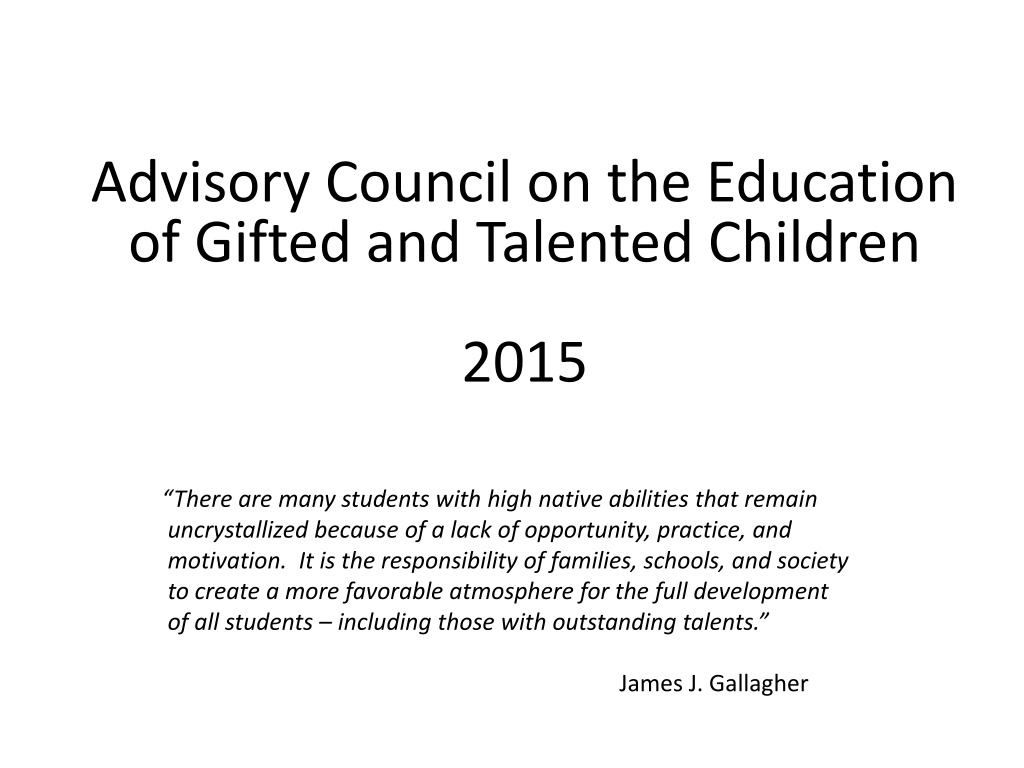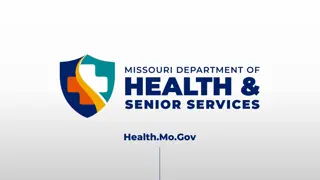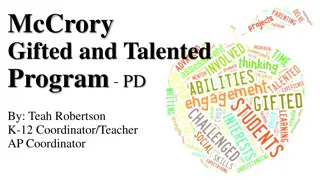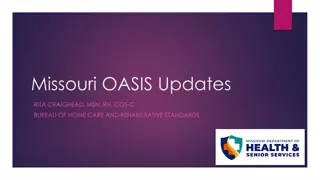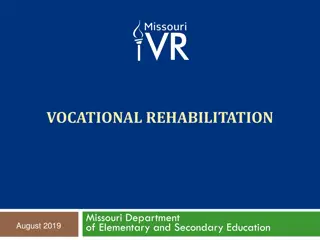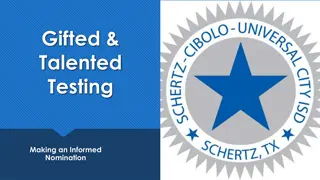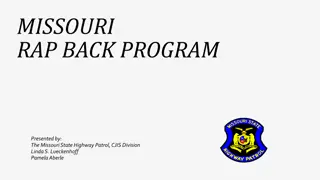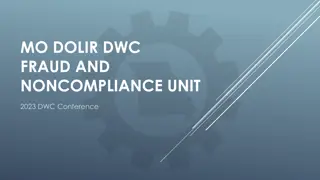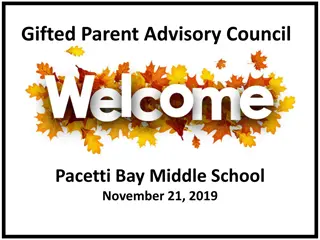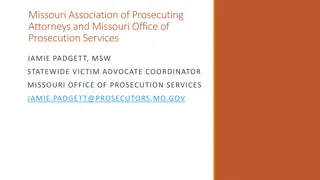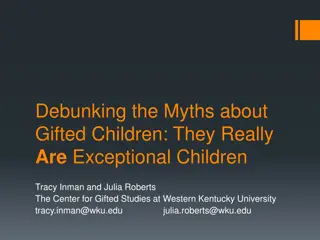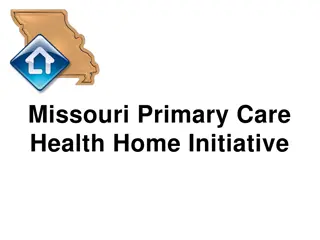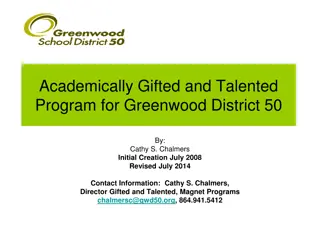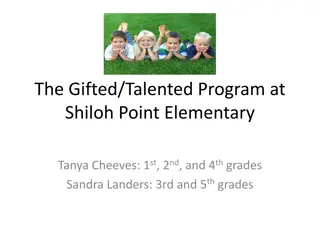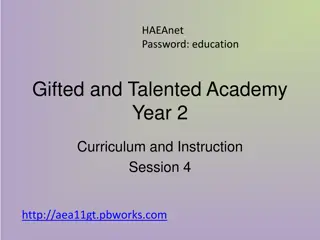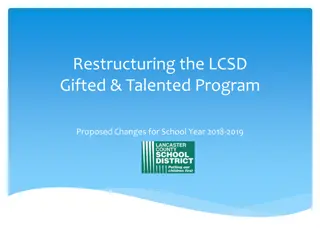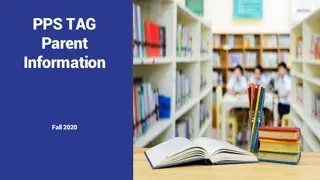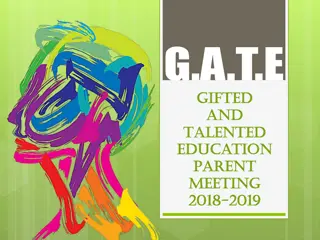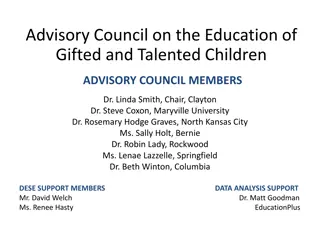Enhancing Support for Gifted Students in Missouri
The Advisory Council on the Education of Gifted and Talented Children in Missouri emphasizes the importance of creating a conducive environment for the development of all students, particularly those with exceptional talents. Established in 2013, the council aims to provide advice on rules and policies related to gifted education. Missouri has positive initiatives, including state statutes recognizing gifted students, guidelines for programs, and the presence of a Gifted Advisory Council. The council's goals include assessing the current status of gifted programs, making recommendations for improvement, and establishing a baseline for future analyses. Financial aspects, programs, student achievement, comparisons with other states, and recommendations are key topics covered in their reports.
Download Presentation

Please find below an Image/Link to download the presentation.
The content on the website is provided AS IS for your information and personal use only. It may not be sold, licensed, or shared on other websites without obtaining consent from the author.If you encounter any issues during the download, it is possible that the publisher has removed the file from their server.
You are allowed to download the files provided on this website for personal or commercial use, subject to the condition that they are used lawfully. All files are the property of their respective owners.
The content on the website is provided AS IS for your information and personal use only. It may not be sold, licensed, or shared on other websites without obtaining consent from the author.
E N D
Presentation Transcript
Advisory Council on the Education of Gifted and Talented Children 2015 There are many students with high native abilities that remain uncrystallized because of a lack of opportunity, practice, and motivation. It is the responsibility of families, schools, and society to create a more favorable atmosphere for the full development of all students including those with outstanding talents. James J. Gallagher
ADVISORY COUNCIL MEMBERS Dr. Linda Smith, Chair, Clayton Dr. Steve Coxon, Maryville University Dr. Rosemary Hodge Graves, North Kansas City Ms. Sally Holt, Bernie Dr. Robin Lady, Rockwood Ms. Lenae Lazzelle, Springfield Dr. Beth Winton, Columbia DESE SUPPORT MEMBERS DATA ANALYSIS SUPPORT Mr. David Welch Dr. Matt Goodman Ms. Renee Hasty EducationPlus
COUNCIL BACKGROUND Established in 2013 after passage of State Statute 161.249 by the Missouri legislature Composed of seven Missouri residents with expertise in gifted education Members appointed by the Commissioner of Education Responsible for providing advice regarding all rules and policies to be adopted by the State Board of Education relating to the education of gifted and talented children in Missouri.
POSITIVES IN MISSOURI Gifted students are recognized in state statutes; guidelines for gifted programs are established by the State Board of Education (1973) Certification required for teachers of the gifted (1995) Districts are required to report whether they have a state approved gifted program; percent and number of students served is included on Annual Report Cards (2012) Gifted Advisory Council in operation (2013) Full-time Director of Gifted Programs in DESE
GOALS OF REPORT GOAL 1: Create a data-driven understanding of the current status of gifted programs in the state. GOAL 2: Make recommendations for improvement in Missouri s efforts related to gifted and talented children. GOAL 3: Establish a baseline for future analyses and recommendations.
TOPICS OVERVIEWED IN REPORT Finances Programs Students Achievement Comparison States Recommendations
Analysis of Current Gifted Served Compared to 5% and 10% of Student Population 5% 10% 2014 Actual Gifted Students Identified and Served 2014 Current Percent of Students Identified and Served 2014 Missouri Public School Students Additional Students to Reach 5% Additional Students to Reach 10% Students Identified and Served Percent Increase to Reach 5% Students Identified and Served Percent Increase to Reach 10% Region A-St. Louis 265,211 19,252 7.3% 13,261 26,521 7,269 38% B-Kansas City 175,034 7,568 4.3% 8,752 1,184 16% 17,503 9,935 131% C- 141,931 4,845 3.4% 7,097 2,252 47% 14,193 9,348 193% Southwest D-Central 79,368 3,643 4.6% 3,968 325 9% 7,937 4,294 118% E- 65,584 1,503 2.3% 3,279 1,776 118% 6,558 5,055 336% Southeast F-West Central 38,241 703 1.8% 1,912 1,209 172% 3,824 3,121 444% G-South Central 57,345 1,534 2.7% 2,867 1,333 87% 5,735 4,201 274% H- 34,007 876 2.6% 1,700 824 94% 3,401 2,525 288% Northwest I-Northeast 28,555 842 2.9% 1,428 586 70% 2,856 2,014 239% MISSOURI TOTAL 885,276 40,766 4.6% 44,264 9,489 23% 88,528 47,762 117%
Border States IA NE IL MO KS KY TN OK AR
In comparison with border states, only Missouri and Illinois do not have a gifted mandate or earmarked funds for gifted programming. In Iowa and Oklahoma, gifted programming is mandated and fully funded by the state. In Kansas, Arkansas, Tennessee and Kentucky, gifted programming is mandated and partially funded by the state. In Nebraska, gifted programming is not mandated but has funds available for gifted programming.
Top 10 by 20 (DESE) VT ME MT MN WI NY MA CT NJ VA MO
Of the Top 10 by 20 DESE comparison states, seven have a mandate for gifted programming. Those states are Connecticut, Maine, Minnesota, Montana, New Jersey, Virginia and Wisconsin. Only Massachusetts, New York and Vermont have no mandate. Five of the states have partial funding for gifted programming. Those states are Maine, Minnesota, New Jersey, Virginia and Wisconsin.
SUMMARY - KEY FINDINGS Gifted programs are in decline in many regions of Missouri. Districts with gifted programs by 31% Students in gifted programs by 17% Certified teachers in gifted programs by 12% Funding of gifted programs by 16% Note: Gifted programs=State approved gifted programs
SUMMARY - KEY FINDINGS In comparison with neighboring states, only Missouri and Illinois do not have a gifted mandate or earmarked funds for gifted programming. Of the Top 10 by 20 DESE comparison states, seven have a mandate for gifted programming. Students served in gifted programs outperform all other students in Missouri on MAP tests at all grade levels tested.
RECOMMENDATIONS The report concludes with 10 recommendations for action, grouped into five broad areas: Reporting data on gifted students and programs Identification of gifted students Programming for gifted students Educator preparation and professional development Requiring and funding gifted education Report Pages: 37-43 Format: Problem Recommendation Rationale
Reporting Data on Gifted RECOMMENDATION 1: DESE should make district information related to state approved gifted programs readily accessible to the public. RECOMMENDATION 2: DESE should generate an annual state data report in October on gifted students and state assisted gifted programs.
Identification of Gifted Students RECOMMENDATION 3: DESE should eliminate the practice of reporting students as gifted based on the criterionof being enrolled in an Advanced Placement (AP) and/or International Baccalaureate (IB) course. Additionally, AP and/or IB courses should not be counted as part of a state approved gifted program.
Identification of Gifted Students RECOMMENDATION 4: DESE should provide a best practice model for districts to use in identifying and serving students who are traditionally under-represented in gifted programs, the goal being to have program participants more closely reflect, percentage- wise, the ethnic, socio-economic and linguistic diversity of individual school districts.
Identification of Gifted Students RECOMMENDATION 5: DESE should provide a best practice model for districts to use in identifying students who are twice exceptional (students with both learning challenges due to disabilities and/or physical impairments and exceptional learning abilities).
Programming for Gifted Students RECOMMENDATION 6: DESE should require all Missouri districts to have a policy allowing acceleration for students demonstrating advanced performance or potential for advanced performance and the social/emotional readiness for such acceleration. The policy should include subject acceleration and whole grade acceleration, among other opportunities.
Educator Preparation & Professional Development RECOMMENDATION 7: DESE should require all teacher preparation programs to include a minimum of one 3-credit course addressing the nature and needs of gifted students and designing curriculum and instruction to meet those needs.
Educator Preparation & Professional Development RECOMMENDATION 8: DESE should require all districts to provide teachers ongoing professional development addressing the nature and needs of gifted students and designing curriculum and instruction to meet those needs. Professional development may include such options as staff development, university coursework, professional conferences, workshops, and web-based learning.
Requiring & Funding Gifted Programs RECOMMENDATION 9: Gifted identification and programming should be required in Missouri. RECOMMENDATION 10: Earmarked funds should be allocated for gifted identification and programming in Missouri.
Failure to help the gifted child is a societal tragedy, the extent of which is difficult to measure but which is surely great. How can we measure the sonata unwritten, the curative drug undiscovered, the absence of political insight? They are the difference between what we are and what we could be as a society. James J. Gallagher
